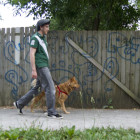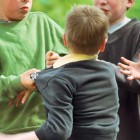
17-year-old Accused of Killing Georgia Deputy has Long Criminal History
|
Sunday’s Atlanta Journal Constitution has a story about 17-year-old Jonathan Bun, the youth who stands accused of the recent shooting death of a Clayton County, Ga., sheriff’s deputy. The story quotes Judge Steven Teske, a frequent contributor to the JJIE, as saying that he and other authorities in the state’s system recognized Bun as hardened as early as age 13. Despite efforts to divert Bun, he fell into serious crime and drug use, say police, culminating in the July 20 shooting of Deputy Richard Daly. If convicted, Bun could be sentenced to life in prison without the possibility of parole. In the story, Teske says about 8 percent of repeat juvenile offenders stand very little chance of rehabilitation.








